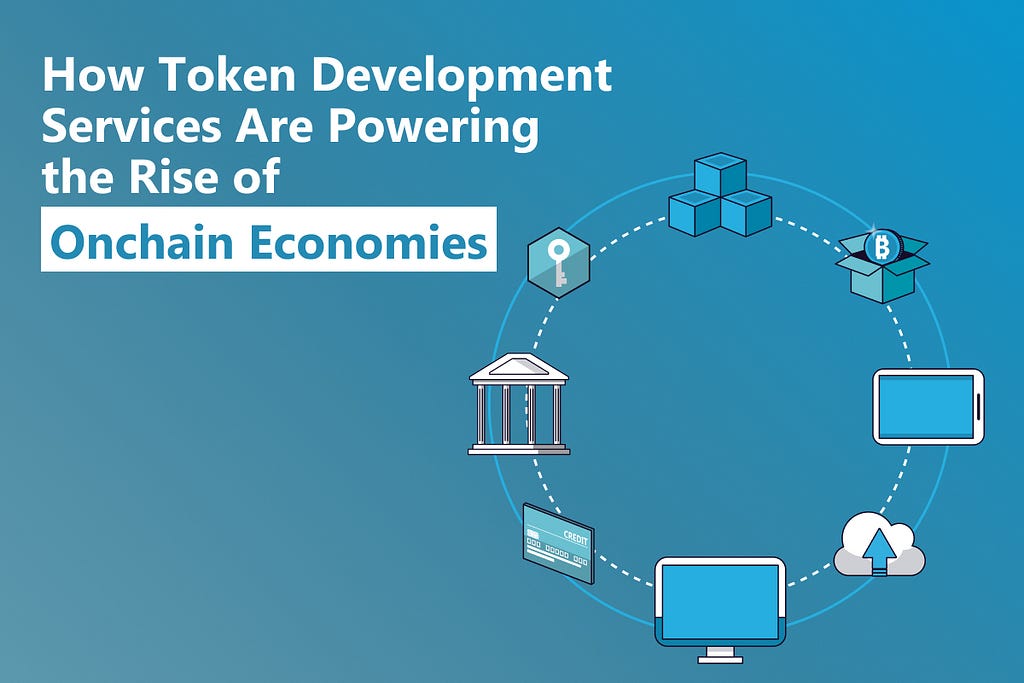
Decentralized finance and onchain ecosystems are impacting how individuals, businesses, and communities interact economically. The concept of tokens — digital assets that live on blockchain networks — is at the center of this evolution. As enterprises search for stronger participation in blockchain-driven industries, customized token creation has become vital. Companies offering Token Development Services are now building the foundation of digital economies, allowing businesses to access new funding models, streamline trade, and explore entirely new business models.
This article explains how token development services support the expansion of onchain economies. It covers the different types of tokens, their use cases, the process of development, and their impact on industries. It also highlights why partnering with the right token development company is essential for businesses that want to stay competitive in decentralized markets.
Understanding Onchain Economies
An onchain economy refers to all forms of economic activities — such as trading, lending, asset transfers, gaming, or community contributions — that occur directly on blockchain networks. Instead of being managed by a central authority, these activities are facilitated through smart contracts and cryptographic rules.
Key features of onchain economies include:
- Transparency: All transactions are publicly verifiable on the blockchain.
- Accessibility: Anyone with internet access can participate.
- Programmability: Rules of exchange, incentives, or ownership can be embedded into smart contracts.
- Interoperability: Tokens can often move across multiple platforms and ecosystems.
Tokens, therefore, are the fundamental building blocks of these economies. They can represent money, ownership, rights, or even community participation. Businesses seeking to become part of this digital economy usually begin with token creation.
What Are Token Development Services?
Token Development Services refer to professional solutions provided by blockchain experts to create and implement tokens on blockchain networks such as Ethereum, Solana, Binance Smart Chain, or Polygon. These services not only cover the technical aspects of token creation but also guide businesses through compliance, security, distribution, and platform selection.
The scope often includes:
- Token Design Consulting: Identifying the type of token — utility, security, or NFT — based on the business use case.
- Smart Contract Development: Writing and auditing the code that governs token rules.
- Blockchain Selection: Choosing the right chain considering transaction fees, security, and scalability.
- Wallet Integration: Allowing users to store and transact with tokens safely.
- Exchange Listings: Facilitating token availability on crypto exchanges for liquidity.
- Regulatory Guidance: Advising clients on laws and best practices in token distribution.
For businesses, working with a token development company saves time, reduces risks, and delivers solutions matching real use cases while aligning with future expansion needs.
Types of Tokens Driving Onchain Economies
Different types of tokens play different roles in blockchain-driven ecosystems. Understanding these categories is essential to know how they shape economic interactions.
Utility Tokens
- Provide holders access to services or functions within a platform.
- Commonly used in decentralized applications for transaction fees, voting power, or service access.
- Example: Tokens used to pay for transactions in a decentralized file storage system.
Security Tokens
- Represent ownership in assets such as shares, bonds, or real estate.
- Must comply with securities regulations.
- Provide dividends, profit shares, or voting rights.
Stablecoins
- Pegged to fiat currencies like USD or commodities like gold.
- Reduce volatility and are widely used in trade, payments, and savings.
Non-Fungible Tokens (NFTs)
- Represent unique digital assets such as art, collectibles, in-game items, or proof-of-ownership credentials.
- Have significant growth in areas like gaming, entertainment, and real estate records.
Governance Tokens
- Provide voting rights in decentralized organizations (DAOs).
- Enable participants to influence protocol upgrades and governance decisions.
Each category contributes differently to the growing structure of onchain economies.
The Role of Token Development in Onchain Economies
Token development is not just about creating digital assets — it is about structuring digital participation in a growing marketplace. By designing tokens, businesses define how value is stored, shared, and transferred across networks.
Some of the key roles token development plays include:
- Capital Formation: Businesses raise funds through token offerings instead of relying only on traditional banking models.
- Liquidity Creation: Tokenized assets can be traded globally on exchanges, allowing easier access to buyers and sellers.
- Global Accessibility: Removing entry barriers opens opportunities for international participation.
- Governance and Participation Models: Tokens provide voting rights, aligning community interests with platform growth.
- Incentive Mechanisms: Tokens motivate desired actions from users, such as staking, referrals, or participation in networks.
Why Businesses Are Adopting Tokens
Businesses across industries are shifting their attention toward token-driven models because tokens open avenues unavailable in traditional structures. The reasons include:
- Raising Funds Efficiently: Initial Coin Offerings (ICOs), Security Token Offerings (STOs), and Initial DEX Offerings (IDOs) are modern fundraising models.
- Building Communities: Tokens foster user participation and loyalty.
- Global Reach: Tokens enable any business to expand beyond geographical restrictions.
- Programmability: Automated economic logic reduces reliance on intermediaries.
- Brand Innovation: A custom token can strengthen identity and create unique client engagement methods.
Token Development Lifecycle
A structured development lifecycle ensures tokens function as intended. Firms working with blockchain developers follow clear steps:
- Requirement Gathering and Analysis:
Understanding the client’s business model, goals, and token use case. - Token Architecture and Design:
Planning supply, distribution, governance rules, compliance checks, and blockchain selection. - Smart Contract Development:
Writing the underlying code for supply rules, minting, burning, transfers, and upgrades. - Testing and Security Audits:
Simulating transactions and ensuring the token smart contract is free of bugs and vulnerabilities. - Deployment:
Launching tokens onto the chosen blockchain. - Integration:
Enabling wallets, payment solutions, and exchange listings to make tokens usable. - Maintenance and Support:
Tracking usage, improving features, and resolving technical issues post-launch.
This structured lifecycle guarantees consistent outcomes and complements onchain adoption strategies.
Industry Use Cases of Tokens
Finance and Banking
- Tokenized securities, stablecoins, and CBDCs (Central Bank Digital Currencies).
- Cross-border settlements at reduced cost.
Supply Chain
- Tracking goods by embedding ownership history in tokens.
- Preventing counterfeit items through verified digital tokens.
Healthcare
- Tokenizing health records with patient-controlled access.
- Incentivizing medical research participation.
Real Estate
- Fractional ownership through security tokens.
- Easier property transfer using blockchain records.
Gaming and Entertainment
- Token-based in-game economies.
- NFTs providing ownership rights for digital goods.
Retail and Loyalty Programs
- Tokens representing reward points redeemable across platforms.
As these sectors embrace token solutions, onchain economies become stronger and more interconnected.
Benefits of Partnering with Token Development Companies
For businesses eager to enter this domain, working with experienced token development providers offers:
- Technical Expertise: Updated with blockchain trends and standards.
- Security Practices: Knowledge of code audits, bug fixing, and secure deployments.
- Scalability Planning: Tokens built to handle higher transaction loads over time.
- Regulatory Awareness: Guidance in building compliant tokens aligned with local and global jurisdictions.
- End-to-End Support: From architecture to post-launch maintenance.
Partnering with leading token developers means businesses focus on their use cases while technical requirements are handled by experts.
Challenges in Token Development
Despite the potential, token creation presents challenges businesses must consider:
- Regulatory Complexity: Navigating compliance across multiple countries.
- Market Competition: New tokens face pressure in achieving real adoption.
- Security Concerns: Risks of smart contract bugs and hacking.
- Volatility: Except for stablecoins, token valuation can vary sharply.
- User Education: Many end-users still struggle to interact with tokens effectively.
A reliable development partner can address these challenges with strategy and technical readiness.
Future of Onchain Economies with Tokenization
The token economy is still in an early stage, but developments suggest tremendous growth ahead:
- Decentralized Autonomous Organizations (DAOs): Governance tokens fueling collective platforms.
- Tokenized Real-world Assets (RWA): Everything from bonds to real estate will exist on blockchain.
- Cross-chain Participation: Tokens interoperable across multiple networks.
- Integration with AI and IoT: Automated devices and intelligent systems interacting with token-based payments.
- Wider Business Adoption: SMEs, startups, and global corporations alike exploring custom tokens.
The long-term trajectory is clear: tokens will be integral to how global commerce functions in digital marketplaces.
Conclusion
Onchain economies are building new ways for businesses and communities to interact. Tokens stand at the heart of this transition, offering solutions for capital raising, asset ownership, governance, and community growth. Professional Token Development Services simplify the journey for organizations, providing expertise to design, deploy, and expand token-based ecosystems.
If your business is exploring token creation for fundraising, community incentives, or product innovation, now is the right time to act. Specialized support from experts can accelerate your entry into onchain markets while minimizing risks.
Take the next step in building your digital economy. Partner with Codezeros for comprehensive Token Development solutions and move ahead with confidence.
A message from our Founder
Hey, Sunil here. I wanted to take a moment to thank you for reading until the end and for being a part of this community.
Did you know that our team run these publications as a volunteer effort to over 3.5m monthly readers? We don’t receive any funding, we do this to support the community. ❤️
If you want to show some love, please take a moment to follow me on LinkedIn, TikTok, Instagram. You can also subscribe to our weekly newsletter.
And before you go, don’t forget to clap and follow the writer️!
How Token Development Services Are Powering the Rise of Onchain Economies was originally published in Stackademic on Medium, where people are continuing the conversation by highlighting and responding to this story.








